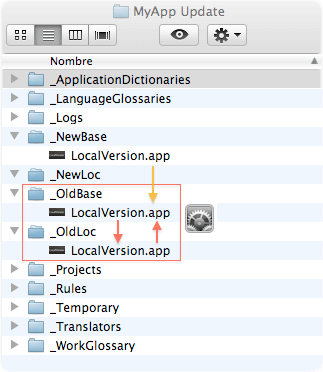Localization is not particularly expensive, but like with restaurants, hotels, doctors or lawyers, your favorite translation partner will probably not be the cheapest one.
Professional translators earn 25% below average salaries in Western countries. When clients put excessive pressure on rates, they are actually choosing to work with localizers who earn even less than that, which leads to high risks of wrong translations, poor style, miscommunication, or even legal issues.
Accurate, specialized translations demand much more time and expertise than bad translations or easy, generic jobs. If your English texts are clear, natural and carefully written, your foreign users expect exactly the same in their own language.
So, you want to sell more. Great! You have invested a lot in creating your products and they have the potential to sell more around the globe. The non-English speaking markets are huge and growing fast. Globalization is one of the biggest business opportunities today and in the years to come.
Yet, localization can be intimidating. It might involve an uncertain amount of work on your side, plus you have to market your products, support your end users... The ROI is hard to predict. Then, all those translation companies seem to use the same marketing blurb. They all promise “quality” but what does that mean, and does it really matter? And why are their prices so confusing (word rates, fuzzy matches, additional fees) and so different from one another? Is a €0.15 word rate fair, cheap or expensive? And how am I supposed to tell if a translation is excellent and will help me sell more or if it is horrendous and will ruin my reputation?
Choosing your translation partner is not an easy job. You can certainly tell if a text is well written in your native language, but not in foreign tongues. By looking at a company’s web site, you can get some idea about how good their web designers or their web budgets are, but that does not necessarily reflect how reliable the company is and whether it is the right provider specifically for you. Serious, professional translators only work in a couple of well delimited areas where they are really seasoned experts. If a translator or company claims that they can translate “anything,” that is a clear sign that you can expect all kinds of issues. But since translation buyers often cannot tell a professional translation from a dangerous one (understandably), some vendors are marketing their services as “cheap” when they are actually very expensive considering what you get in return.
The table below summarizes a range of services offered today by different translation companies and common word rates for each. Prices will vary by language, volume and complexity, but it can give you an idea. Each service can make sense for some specific purposes. The questions are: What service do YOU need? What costs are competitive? Why?
Columns show who performs the first-pass translation. Rows show how that first-pass translation is then reviewed. For example, in the market you can find translations done by a native speaker and then reviewed by a second person at €0.07 to €0.11 per word. A highly specialized translation done by a senior specialist, reviewed by a second specialist and then proofread can cost €0.18-0.23 per word.
Note that these are not our rates, but common rates that you can find in the market offered by different types of providers. At LocalVersion, we only focus on services involving native, senior translators specialized in some specific fields (software localization, technical documentation, Apple products, information technology, web contents, and related marketing and legal materials). Here our rates are extremely competitive, since we are a relatively small and committed team of specialists, and practically all your money goes straight into the pockets of your localizers.
| Machine translation or translation by non-native speaker | Translation by native speaker | Translation by native, junior translator | Translation by native, senior translator | Translation by native, senior specialist |
| Not reviewed | € 0.00 / 0.05 You may get the gist of what a text is about. Most sentences will be strange, wrong, ugly and/or dangerous. | € 0.03 / 0.07 The easy parts may be understandable but the translation will be very poor, literal and full of errors. It may be understandable for sentences that are very easy and if style is not a concern. | € 0.06 / 0.11 The easy parts may be acceptable but the style will be poor, literal and with errors due to inexperience. It may be an option for easy, non-specialized translations if errors and poor style are acceptable. | € 0.09 / 0.13 The translation should be okay if the text is not specialized. There will be some errors, mistranslations and inconsistencies here and there that a good reviewer would spot and fix. | € 0.11 / 0.15 The translation (highly specialized field) should be good. There will be some errors, mistranslations and inconsistencies here and there that a good reviewer should be able to spot and fix. |
| Reviewed | | € 0.07 / 0.11 It makes little sense to review a translation if the translator was not a qualified professional. The quality would still be poor. | € 0.09 / 0.14 The reviewer will fix a few errors but the style will still be poor and there will be translation issues, particularly if the text is specialized or not very easy. | € 0.13 / 0.17 The translation should be correct in general if the text is not specialized. There will be some errors and mistranslations if the field requires specialization. | € 0.16 / 0.20 The translation should be excellent. There might be some minor issues if not proofread. |
| Proofread | | | | € 0.15 / 0.20 The translation should be reliable. | € 0.18 / 0.23 The translation should be excellent and error-free. |
So, for example, is a €0.15 word rate for French expensive? What hourly rate would that be?
Typically, if an agency charges €0.15, around 50-60% will go to the translator(s), 20% will go to the reviewer(s), 10% will pay for project management, tools and infrastructure, and 10-15% will be the agency’s margin (7-10% after taxes).
Professional translators translate on average 1,800-2,600 words per day. This varies greatly depending on the complexity of the texts and on how important style is (marketing texts and highly specialized documents are much slower to translate). A good translator can be busy translating around 75% of the time on average, so they will translate about 380,000 words a year. If they are paid €0.075 per word, they will earn €28,500 in a year (gross). After taxes, this is reduced to €17,000-22,000. They should still deduct what they spend on computers, tools and everything they need to do their work. So that senior, busy, English to French translator will earn around €19,000 a year. This is 25-30% below average disposable salaries in France or Canada, in spite of the fact that good translators typically have at least one university degree and 8+ years of professional experience. Rates in other languages are often lower.
So, when clients put excessive pressure on word rates, they may not be aware but they are in fact asking for their localization “experts” to earn less than €13,000-16,000 a year. Chances are high that those translations end up being assigned to "cheap", junior translators who will rush to translate as many words as possible, with little care and very poor results.
In 2008-2012, average translation rates and salaries fell, as in many other industries. Some percentage was due to the law of supply and demand. But most of the fall was due to the fact that the quality offered in return decreased dramatically (non-professional translators, dropped QA steps, more literal and robot-like translations that are confusing or misleading and do not make for a good brand image, etc.). This is probably understandable for some tiny start-ups with a very small audience and budget, but for well-established companies, the relatively small savings in translation costs can badly affect the brand image and lead to poorer sales and customer dissatisfaction.
To sum up, when comparing translation rates, it is important not to compare apples to oranges. If your budget/sales are extremely low, you still want to offer your products in other languages and quality is not a concern, you can probably find some cheap alternative, keep your fingers crossed and hope to be lucky. If you are a successful company and you plan to sell more than a few copies of your localized products, you will want to offer the same good image and quality in your localized products as you offer to your English-speaking users, so you will want to work with a senior, professional team specialized in your particular field. The localization costs will be a bit higher, but they will still be a fraction of what it will mean in terms of international sales, brand image, and customer satisfaction.







